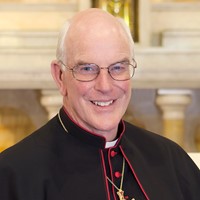It was that very night, 25 April, that the authorities in Constantinople, now Istanbul, arrested hundreds of Armenian leaders in the city, politicians, clergy, lawyers, teachers and so on. The Ottoman leaders had long feared that the Christian Armenians, with their own nationalist aspirations, would welcome Christian invaders of the Empire as potential liberators. Indeed, there were already tales of Armenian soldiers in the eastern provinces deserting to the Russians, for whom many Armenians living under Russian rule were already fighting. Equally, there were stories of Turkish troops who simply shot their Armenian fellow-soldiers rather than take the risk of their betrayal. No wonder, then, that the central government, with the British and allied forces at the doorway to Constantinople, acted to defuse the perceived Armenian threat. But that was not yet genocide.
The service at Chatswood was presided over by the Primate of the Armenian Church in Australia, Bishop Najarian. Much of his address was really directed to the people of other churches and nationalities who were present, for he rehearsed, with exemplary brevity and accuracy, the main lines of Armenian history. Like any good Armenian, he began with the fact that Armenia was the first Christian nation. Their king adopted Christianity as the religion of his people in, I think, 308 AD, before Constantine and all that, and long before Rome became officially Christian. From then on and always, Armenia had the misfortune to lie on the fault line between mighty empires: Rome and Persia, Byzantium and the Moslem east, the Ottomans and the Russians. Through it all, with remarkable tenacity, the Armenians clung to their identity as a people and to their church. They do so to this day.
The actual genocide of the Armenians during the Great War began when the Ottoman government decided to remove them from provinces where they might be of assistance to invading armies. So from the Armenian lands in the east, from the areas around the Dardanelles, from the regions close to the Mediterranean coast, Armenian villages were cleared of their populations. Often enough, the men of military age were simply separated out and shot. The greater death toll, however, probably occurred on the forced marches of old men, women and children. Through winter snows or desert heat, huge columns of villagers were marched hundreds of miles to 'safe' areas in Syria or Iraq, far away from allied forces. Food, clothing and shelter were minimal or non-existent and stragglers were often shot or left to die where they fell. Memories are preserved of mothers who threw themselves and their children into rivers to drown rather than die slowly by the roadside. Nobody knows with any certainty how many people died in this genocide, but the conventional figure is about 1.5 million.
What the Armenians want today is for the world to acknowledge what happened. They want their story to be known and their martyrs to be remembered. The Turkish government, of course, denies that the genocide ever happened. But also, there are relatively few countries in the world that officially acknowledge it, even now. It was still noteworthy, and somewhat controversial, when Pope Francis spoke unequivocally of the Armenian tragedy as 'the first genocide of the 20th century'. There is no real doubt, however, about what took place. Way back in 1917-18, British troops making their way to Damascus and up through Iraq reported passing along roads littered with bones. The historian Arnold Toynbee took testimony from many, many Turkish soldiers, district administrators and so on, confirming again and again that the shooting of men and of stragglers and the deliberate marching to death of villagers were done on orders from the usual military and civil authorities. The actual numbers of those killed can never be firmly established, but the fact of a policy to get rid of as many Armenians as possible cannot be denied.
The other purpose of the ecumenical service I mentioned above was to pray for persecuted Christians and other religious minorities today. The Armenians can see themselves in what is happening to Christians and other minorities in Syria, for example, but not only in Syria. They know what it is to have your story ignored by the world for a century; they know what it is to have the world look away. They pray that the world will not look away or forget persecuted people. Even on the far side of the world, even in Chatswood, they ask us not to forget, and not to look away.




























































































